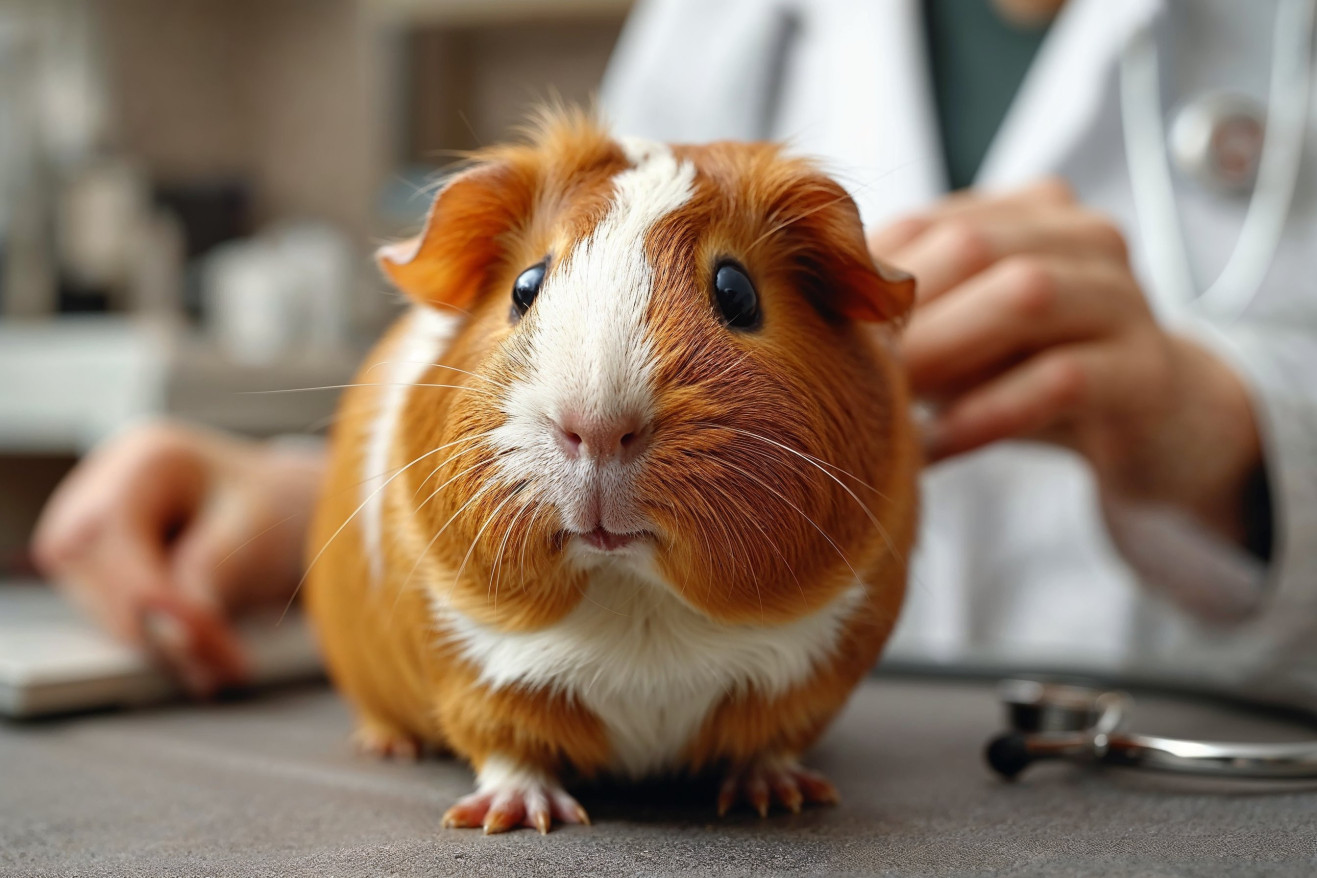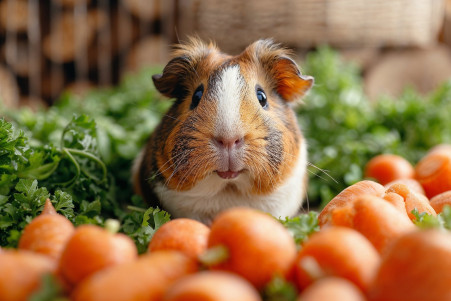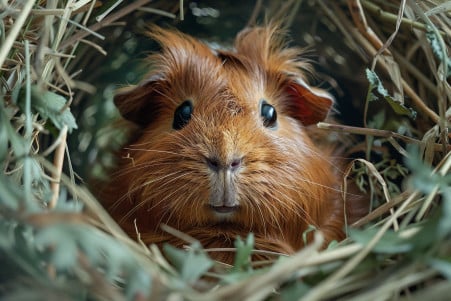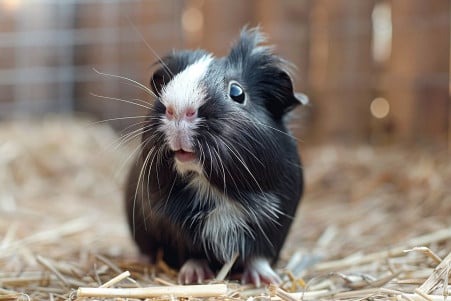Guinea Pig Health Problems: How to Recognize and Prevent Common Ailments
30 January 2024

Despite their sweet dispositions, guinea pigs are prone to a number of health problems. Some of the most common health issues in guinea pigs include respiratory infections, scurvy from a lack of vitamin C, dental disease, skin conditions like mites, and digestive issues. Many of these problems can be avoided with regular veterinary care and a healthy diet.
This article will cover veterinary research, nutritional studies, and zoological literature to outline the most common health problems in guinea pigs. It will also cover the impact of diet, environment, and genetics on the health of these little pets. This in-depth research will give you the information you need to recognize the early signs of these issues and keep your guinea pig healthy.
What are common health issues for guinea pigs?
Guinea Pig Diet: The Importance of Vitamin C
Since guinea pigs are unable to produce their own Vitamin C, it is important that they get it from their diet to avoid a deficiency, such as scurvy. PetMD notes that signs of a Vitamin C deficiency in guinea pigs include lethargy, dental problems, and a rough coat. If left untreated, these symptoms can lead to more serious issues, such as respiratory distress and death.
The RSPCA states that a healthy guinea pig diet should consist mainly of good-quality hay, fresh grass, and a daily serving of Vitamin C–fortified pellets.
In addition, it is important for pet owners to make sure that fresh, washed leafy greens are a regular part of their guinea pigs’ diet to ensure they get enough of this important nutrient. The PDSA also emphasizes the importance of a high-fiber diet, which is important for digestive and dental health, especially since guinea pigs’ teeth grow continuously and need to be worn down by fibrous foods.
PetMD suggests that guinea pigs be given fresh vegetables like kale, parsley, and bell peppers to help ensure they get enough Vitamin C.
It is important that pet owners make sure that these vegetables are given to their pets on a regular basis and that they are fresh since the Vitamin C content of these foods decreases over time.
If a deficiency occurs, pet owners will need to manage their pet’s diet for the rest of their life, making sure that they get enough Vitamin C to avoid a recurrence. By making sure that their pets get a well-balanced diet that includes all of the essential nutrients they need, pet owners can help ensure that their guinea pigs stay healthy and happy, which can also help reduce the risk of parasitic infections.
Dealing With Parasites in Guinea Pigs
Parasites are a major health concern for guinea pigs, and ectoparasites like mites and lice and endoparasites like gastrointestinal parasites can cause a range of problems.
The International Veterinary Information Service lists common ectoparasites like the burrowing Trixacarus caviae mite, which causes intense itching and discomfort, and the louse Gliricola porcelli, which can cause hair loss and skin irritation. Meanwhile, common internal parasites include Eimeria caviae and Cryptosporidium wrairi, which can cause gastrointestinal upset, and Encephalitozoon cuniculi, which can cause urinary tract issues.
Parasites can cause a range of symptoms, including hair loss, itching, and in more severe cases, lethargy and weight loss, according to Guinea Pig Vet. Parasites are typically diagnosed through microscopic examination of skin scrapings or fecal samples.
Treatment for parasites often involves antiparasitic medications and environmental management, which includes cleaning to prevent reinfestation. Preventing parasites involves regular veterinary care and maintaining a clean, sanitary environment. Veterinarians play a key role in diagnosing and treating these issues and in helping pet parents understand how to prevent them. In addition, keeping a clean, parasite-free environment for guinea pigs can also help prevent respiratory diseases, which are another common health issue for these pets.
Guinea Pig Nasopharyngeal Stenosis
Respiratory diseases are a common problem in guinea pigs and can cause everything from a runny nose to labored breathing. Guinea pigs are obligate nasal breathers, so conditions like nasopharyngeal stenosis can cause them a lot of distress. This condition was found in a study published in ScienceDirect. Bacterial pathogens, including Bordetella bronchiseptica and Streptococcus pneumoniae, are common culprits, as noted in a survey published in Animals.
Diagnosing respiratory diseases in guinea pigs can be difficult for vets because of the animals’ small size and the fact that they often don’t show many clinical signs. This is where advanced imaging, such as CT scans, comes in handy for diagnosing nasopharyngeal stenosis cases. Once diagnosed, respiratory diseases are often treated with antibiotics and anti-inflammatory drugs to help reduce inflammation.
Early detection of respiratory diseases is important because the sooner the guinea pig gets to the vet, the better the outcome. Owners can help by watching for signs of respiratory diseases and keeping their guinea pigs in a clean, low-stress environment that will help support their respiratory health and reduce the risk of infection. With proper care, owners can help reduce the risk of respiratory diseases and help keep their guinea pigs healthy.
Preventative Care for Your Guinea Pig
In addition to regular vet visits, which are important for maintaining your guinea pig’s health and catching any potential health issues early, PDSA notes that daily health checks are also important. These checks should include looking at your guinea pig’s face, eyes, coat, and behavior for any signs of illness.
If you notice any changes in your guinea pig’s behavior, like a loss of appetite, lethargy, or weight loss, you should take them to the vet right away.
A healthy living environment is also important for your guinea pig’s health. Proper housing and cleanliness can help prevent many common health issues, including respiratory and fungal infections. VCA Animal Hospitals also notes that stressors like overcrowding can make animals more susceptible to diseases, so keeping your guinea pig’s living environment as stress-free as possible is important.
PDSA’s daily health checks also include looking for signs of breathing problems, diarrhea, and skin issues. In addition, vets may recommend neutering for health reasons, and it’s important to make sure your guinea pig has access to chewable materials and a healthy diet to prevent dental diseases.
Taking care of these preventative measures is part of being a responsible pet owner and will help ensure that your guinea pig stays healthy and happy in the long run. By following these guidelines, you can create an environment that supports your pet’s health and well-being.
How to Take Care of a Healthy Guinea Pig: A Care Guide
When it comes to taking care of guinea pigs, knowing what to look out for in terms of health problems is essential to keeping these wonderful pets healthy. From understanding the importance of Vitamin C in preventing scurvy to the dangers of parasites and the severity of respiratory issues, it’s important to be proactive when it comes to guinea pig health.
We’ve covered the importance of feeding guinea pigs a healthy diet, taking them to the vet regularly, and watching for signs of potential health issues. By learning about their dietary requirements, understanding the signs of common health problems, and using good management techniques, we can make sure our guinea pigs are happy and healthy.
As guinea pig enthusiasts, we can make a significant impact on their well-being by being alert and committed to their care. Let’s continue educating ourselves, watch for their requirements, and enjoy the delight they provide us. Caring for a guinea pig is a rewarding experience, and it’s one that’s brimming with joy when we’re assured that we’re looking after a content and robust pet.


